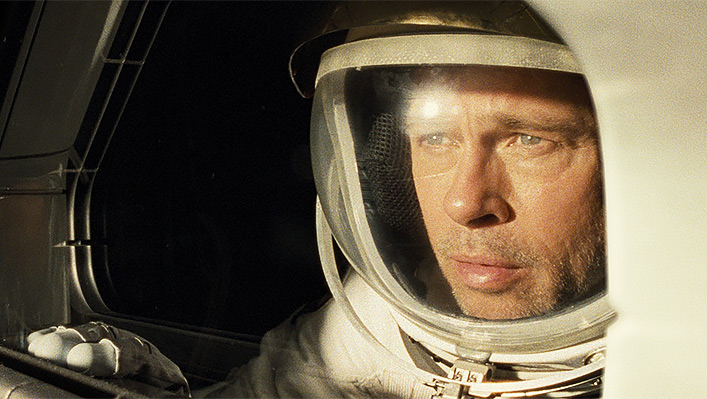Ad Astra shows why outer space is a great setting for drama

In Ad Astra, Brad Pitt plays an astronaut who journeys through space in search of his father. Luke Buckmaster uses the film to discuss what makes space settings so compelling for stories about personal voyages.
Ad Astra is the kind of experience that sounds rather boilerplate – or even cheesy and hackneyed – when you express its essence in words. It is a voyage of personal discovery. It is about looking for something and being prepared to let it go. It is about things that are found and things that are lost.
It is about masculinity, fatherhood, solitude. It follows an astronaut (played by Brad Pitt) constantly making melancholic reflections about his relationship with his old man. It is sort of film – helmed by The Lost City of Z and The Immigrant director James Gray – that tends to be described using parlance such as “meditative,” due to its pensive qualities and long and contemplative pauses.
Introductory text explains that Ad Astra is set in the near future, during “a time of hope and conflict” – which could describe any moment in human history, but no matter. Humankind appears to have survived the climate crisis and capitalism looks like it’s going OK. There’s even an airport on the moon with a Subway; the future has not abandoned footlong rolls and meat that looks like cubes of lard.
There is, however, a new existential threat, not just to humankind but to the stability of the entire solar system (“we take your climate crisis and raise you an intergalactic crisis,” the masters of the universe seem to be saying). This threat is posed by a series of mysterious power surges, which are less like malfunctions of electronic circuitry than anger from the gods.
One surge causes an accident on a giant space antenna, where we meet Major Roy McBride Roy (Pitt). He is sent tumbling from a gut-droppingly high up place, framed with the kind of screen-buckling compositions that would send IMAX executives into paroxysms of delight. Fortunately Roy has a parachute, as well as a special internal coping mechanism: a heart rate that never goes above 80bpm. This guy keeps a cool head.
Scarier than his plummet to the ground, and the thing most likely to get Roy’s pulse pumping, is what his superiors ask him to do next. They request he record a message that will beamed deep into space and may or may not be heard by his father, Clifford McBride (Tommy Lee Jones), who may or may not be alive. Clifford is a famous explorer who went missing while searching for extraterrestrial life. The authorities believe that dad – if he is out there – might have something to do with the surges.
This is scary for Roy, because it means confronting something many men would prefer to keep stuffed away in the dark recesses of their soul: his feelings towards his father. Much of Ad Astra (a Latin phrase meaning “to the stars”) comprises close-up shots of Pitt, matched with voice-over ruminations. The dialogue is deep and mostly delivered to nobody but himself, as if in glum conversation with his psyche, deploying lines such as “I must accept the fact that I never really knew you” and “I’m looking forward to the day my solitude ends.” This guy must be a hit at dinner parties.
It is a star-driven movie that lures audiences with the promise of spectacle, then intentionally only partly delivers. There are a couple of action scenes – including an elegantly staged Mad-Max-on-the-moon buggy chase – but they feel disconnected and extraneous. This is a “thinking person’s” sci-fi, if you will, aspiring for more than the usual “oh look shiny!” and “oh man, loud!”
Ad Astra is also a fine example of why outer space can be such an effective setting for stories about personal journeys. This is demonstrated through both Gray’s aesthetic choices and the situational necessities of floating around in environments outside the earth. In space human dramas tend to unfold in small close-knit environments – corridors and rooms in spaceships, for instance; places where the movement of characters and cameras is restricted.

Just outside these immediate surroundings lies, of course, a vast expanse of black blanket, extending into incomprehensible endlessness. The immediate drama is tight but the context infinite. This suits the interpretation of motion pictures as a kind of psychological playground, because it pushes us towards the immediacy of human presence, emphasising the limitations of our bodies and beings, while simultaneously suggesting anything is possible. A great beyond of danger and opportunity.
I came out of Ad Astra thinking about how the realms of the mind, and the realms of space, bear some similarities in terms of mystery and magnitude. Do we really understand ourselves, each other, or our place in the universe? Is the space of our mind just as vast as the space beyond our planet?
This sort of reading suits Ad Astra to a tee, given the script (co-written by Gray and Ethan Gross) explores the emotional strength needed to look for something symbolically close to home, yet literally far away. Does all this sound boilerplate, or cheesy, or hackneyed? Maybe. But like Brad Pitt swimming around in space, this very contemplative and philosophic drama keeps swimming around my mind.


















